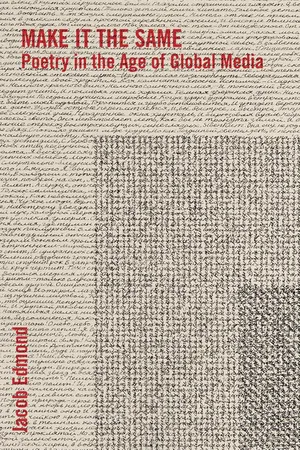
- English
- ePUB (mobile friendly)
- Available on iOS & Android
About This Book
Our world is full of copies. This proliferation includes not just the copying that occurs online and the cultural copying of globalization but the works of avant-garde writers challenging cultural and political authority. In Make It the Same, Jacob Edmond examines the turn toward repetition in poetry, using the explosion of copying to offer a deeply inventive account of modern and contemporary literature.
Make It the Same explores how poetry—an art form associated with the singular, inimitable utterance—is increasingly made from other texts through sampling, appropriation, translation, remediation, performance, and other forms of repetition, as opposed to privileging "innovative" or "original" works. Edmond tracks the rise of copy poetry across media from the tape recorder to the computer and through various cultures, languages, and places, reading across aesthetic, linguistic, geopolitical, and media divides. He illuminates the common form that unites a diverse range of writers from dub poets to conceptualists, samizdat wordsmiths to Twitter-trolling provocateurs, analyzing the works of such writers as Kamau Braithwaite, Dmitri Prigov, Caroline Bergvall, Vanessa Place, Christian Bök, Hsia Yü, and Tan Lin. Edmond develops an alternative account of modernist and contemporary literature as defined not by innovation—as in Ezra Pound's slogan "make it new"—but by a system of continuous copying. Make It the Same transforms global literary history, showing how the old hierarchies of original and derivative, center and periphery are overturned when we recognize copying as the engine of literary change.
Frequently asked questions
Information
Table of contents
- Cover
- Series Statement
- Title Page
- Copyright
- Dedication
- Contents
- Acknowledgments
- Introduction: The Copy as Global Master Trope
- One: Postcolonial Media: Kamau Brathwaite’s Reel Revolution
- Two: The Art of Samizdat: Dmitri Prigov, Moscow Conceptualism, and the Carbon-Copy Origins of New Media Poetics
- Three: Making Waves in World Literature: Yang Lian and John Cayley’s Networked Collaboration
- Four: Shibboleth: The Border Crossings of Caroline Bergvall, Performance Writing, and Iterative Poetics
- Five: Copy Rights: Conceptual Writing, the Mongrel Coalition, and the Racial Politics of Digital Media
- Six: Chinese Rooms: The Work of Poetry in an Age of Global Languages, Machine Translation, and Automatic Estrangement
- Recapitulations: Repetition and Revolution in World Poetry
- Notes
- Bibliography
- Index